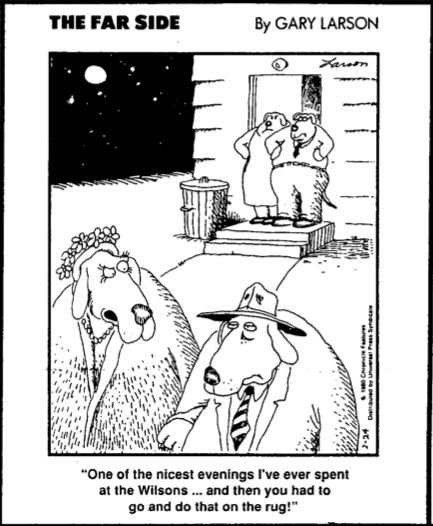Words of Wisdom
"No good deed goes unpunished."
I used to keep that blue-collar quote on a three-by-five card in my cubicle in the Cincinnati Enquirer newsroom, next to my "Reagan on Rushmore" button and a Gary Larson cartoon of a dog wearing "cement overshoes" being dropped off a bridge by two mobsters who said, "He bit the hand that feeds him."
"No good deed goes unpunished" seemed to describe an unusual number of management decisions.
For example: I would choose a letter from a stack of hundreds to publish in Letters to the Editor. We would shorten it to fit our guidelines and clean up bad spellings and fractured grammar. Then the next day I would get a call: "You took out my favorite part!" I finally started warning readers that we had an uncanny talent to find their favorite paragraph in a letter to the editor... and remove it.
Another example was on one of the Enquirer's anniversaries, when we announced that we would make the daily paper smaller -- as a "birthday present" to our loyal subscribers.
This is how my boss probably felt.
One year when we ran our annual August stories about heatwave suffering and deaths in the poorest neighborhoods, I bought a couple of air-conditioners and enlisted the help of some local ex-cons at a halfway house to deliver and install them (Thank you, Mike Howard) for two families in sweltering subsidized housing. The air-conditioners cost about $300. The cost of the dog that bit me: Ouch! The look on that elderly couple's faces as they stood in front of the cool blast of air in a room that felt like 106 degrees: Priceless.
When I wrote a column about it, I was warned by the editor in chief: Never, ever do anything like that again.
It didn't stick.
Words of stupidity
OK, so I watch way too much TV. And I have noticed that the so-called pundits are like the meteorologists: they never get fired no matter how many times they are spectacularly wrong.
They also seem to work from a the same dictionary of Buzzwords for Any Occasion, which is thinner than Bill O'Reilly's Book of Conversational Manners. (I think it's called "Killing Courtesy.")
This is how my boss probably felt.
So I dare you to try the Fox News/CNN Challenge: Turn on any shout show and try to listen for five minutes without hearing:
"At the end of the day..." This tired, geriatric phrase is older than George Will's quill pen that he lifted during the signing of the Declaration of Independence. It's pure filler, a phrase of foam packing peanuts from the Smithsonian Museum of Government Weasel Words. What's wrong with, "In summary," or the most welcome word at every public speaking occasion: "Finally..." Better yet, if that's all you have to say, just stop talking before you say something even more hackneyed and stupid such as "that being said."
"Look..." When someone starts a sentence with "Look..." I immediately "look" for another channel.
"Optics." This one is the 100-proof, distilled spirit of the Washington culture. "Optics." What they mean by "bad optics" is that it looks bad. Never mind the truth or the facts. Everything is appearance. It could be wrong or right, but what matters is the "optics." When so-called journalists use words like "optics," that's a warning sign that they have been hopelessly brain damaged by too many rides on the D.C. spin machine. Please. To paraphrase the redneck test: If you say "bad optics" to describe a felony stupid Washington scandal, you just might be a punditiot, way past your sell date.
... And the Ron Burgundy-Ted Baxter Award for Broadcast Balderdash goers to:
"Double down." If Washington is Hollywood for homely people, TV news is apparently Las Vegas for losers. During the past year the pundits have lost every bet they've made, but they still "double down" like five-martini drunks blowing the college fund at Caesar's Palace. No news analysis or discussion is complete without at least one mention that someone has "doubled down," which in ordinary English means "said something twice that I disagree with," or, "refused to be bullied by media attacks."
One of these nights I will hit the five-fecta and Chris Mathews or Charles Krauthammer will say: "Look, at the end of the day, having said that, they will double down on bad optics." Which, come to think of it, is a pretty good description of the Washington media.


